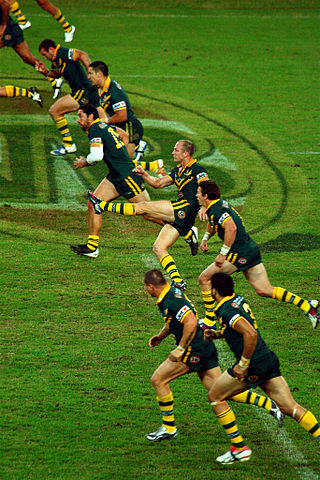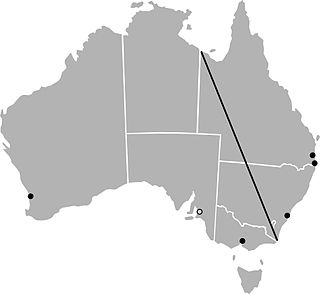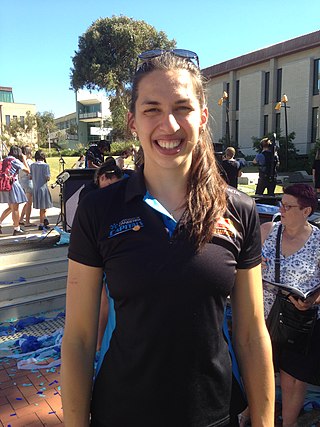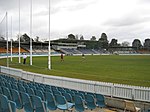
The Australian Institute of Sport (AIS) is a high performance sports training institution in Australia. The institute's 66-hectare (163-acre) headquarters were opened in 1981 and are situated in the northern suburb of Bruce, Canberra. The AIS is a division of the Australian Sports Commission (ASC), part of the Australian Government under the Department of Health and Aged Care.

Manuka Oval is a sporting venue in Canberra, the capital of Australia. It is located in Griffith, in the area of that suburb known as Manuka. Manuka Oval has a seating capacity of 13,550 people and an overall capacity of 16,000 people, although this is lower for some sports depending on the configuration used. The area on which the ground is situated has been used for sport since the early 20th century, but was only enclosed in 1929. It has since undergone several redevelopments, most recently beginning in 2011.

Sport is an important part of Australia that dates back to the early colonial period. Australian rules football, rugby league, rugby union, association football, cricket and tennis are among the earliest organised sports in Australia. Sport has shaped the Australian national identity through events such as the Melbourne Cup and the America's Cup. Australia also holds the record for the largest attendance at a Rugby Union match with almost 110,000 spectators watching the Wallabies play the All Blacks in 2000.

Winter Sports in Australia encompasses a great variety of activities across the continent of Australia, including winter sports played in snow and ice such as ice hockey. Climate varies considerably from the tropical North to temperate South in Australia, and sporting practices vary accordingly. Ice and snow sports like Skiing in Australia are conducted in the high country of the Australian Alps and Tasmanian Wilderness. Australia has relatively low mountain ranges, but a long history of participation in recreational skiing and the Winter Olympic Games. Australians have won olympic gold in ice skating, skiing and snow-boarding events. Australia's generally flat geography and usually mild winter climate otherwise provide ideal conditions for international non-snow/ice winter sports and team games like rugby union football, rugby league football, and association football (soccer), which are all popular sports during the Australian winter and in which Australia has enjoyed considerable international success. Australian rules football is a home-grown winter football code with a wide following throughout Australia. Many other sports are also played or watched in Australia through the winter season.
The Canberra Gunners are an Australian basketball team based in Canberra. The Gunners compete in the Men's NBL1 East and play their home games at Belconnen Stadium. The team is affiliated with Basketball ACT, the governing body for basketball in the Australian Capital Territory. Their sister team, the Canberra Nationals, play in the Women's NBL1 East.

{{maplink|frame=yes|text=ACT and Southern NSW Rugby Union jurisdiction|raw={
"type": "FeatureCollection", "features": [ { "type": "Feature", "properties": {"fill": "#ff0000","fill-opacity": 0.3,"stroke-width": 0}, "geometry": {"type": "Polygon", "coordinates": [[
The Barassi Line is an imaginary line in Australia which approximately divides areas where Australian rules football or rugby league is the most popular football code. The term was first used by historian Ian Turner in his 1978 Ron Barassi Memorial Lecture. Crowd figures, media coverage, and participation rates are heavily skewed in favour of the dominant code on both sides.

The Canberra Vikings, formerly the Canberra Kookaburras, is an Australian rugby union football team that competes in the National Rugby Championship (NRC). The team is based at Viking Park in Wanniassa, and is backed by the Tuggeranong Vikings Group as the licence holder, with the Brumbies and University of Canberra as non-financial partners.
Rugby League is one of the most popular codes of football in the Australian Capital Territory. The Canberra Raiders of the National Rugby League became the Territory's first professional sports team when they were established in 1982. For decades before that rugby league clubs in the area had been competing and providing footballers for representative sides that played against domestic and foreign teams.
Rugby union is a popular sport in the Australian Capital Territory. Rugby football began to be played in the regions around what is now Canberra more than a century ago.

Abby Bishop is an Australian professional basketball forward/center who plays for Southside Flyers of the Australian WNBL. She has played for the Australian Institute of Sport from 2005 to 2006, the Canberra Capitals from 2006 to 2010, Dandenong Rangers from 2010 to 2011 Canberra Capitals. She is currently a member of the Adelaide Lightning (2016/2017). She is a member of the Australia women's national basketball team and won a gold medal during the 2007 Oceania World Qualifications series and a bronze medal at the 2012 Summer Olympics.
The Australian Provincial Championship, or APC was a rugby union football competition played in Australia. It was one of several provincial competitions since the late 1960s, including the Wallaby Trophy and Ricoh National Championship, that have not continued.
Lauren Jansen is an Australian basketball player from the Canberra. She has played several seasons for the Canberra Capitals.

Marianna Tolo is an Australian basketball player for the University of Canberra Capitals in Australia's Women's National Basketball League (WNBL). She has also played for the CJM Bourges Basket in the LFB and Los Angeles Sparks in the WNBA. She has also been a member of the Australia women's national basketball team.

Carly Wilson is an Australian former basketball player. She played for several teams in the Women's National Basketball League (WNBL), including the Dandenong Rangers, Australian Institute of Sport, Perth Lynx and Canberra Capitals. She represented Australia at the Commonwealth Games, where the team won a gold medal.

Tessa Rose Lavey is an Australian professional basketball player for the Bendigo Spirit of the Women's National Basketball League (WNBL) and an Australian rules football player with the Richmond Football Club in the AFL Women's competition (AFLW).

Natalie Hurst is an Australian basketball player. She played junior basketball in Canberra and went on to play for the Canberra Capitals in the WNBL. With the Capitals, she won league championships in 1999/2000, 2001/2002, 2002/2003, 2005/2006, 2006/2007, 2008/2009 and 2009/2010. In 2011/2012, she played for the French club, Aix en Provence. She is a member of the Australia women's national basketball team, with her first national team cap in 2009. She won a gold medal in 2009 at the FIBA Oceania Women's Championships. She is a member of the 2012 national team.

Susanna Geh was an Australian basketball player.
The organisation of sport in Australia has been largely determined by its Federal system of government – Australian Government and six states and two territories governments and local governments. All three levels play an important role in terms of funding, policies and facilities. Each major sport is managed by a national sports organisation, with state counterparts that manage community sporting clubs. Umbrella or peak organisations represent the interests of sports organisations or particular sport issues. Education sector plays a small role through universities and schools. Private sector's involvement is extensive in professional sport through facilities, club ownership and finance/sponsorship.
Abby Cubillo is an Australian professional basketball player. She plays for the University of Canberra Capitals in the Women's National Basketball League (WNBL). She is a national champion and a world champion, and the first player born and raised in the Northern Territory to play in the WNBL.




















